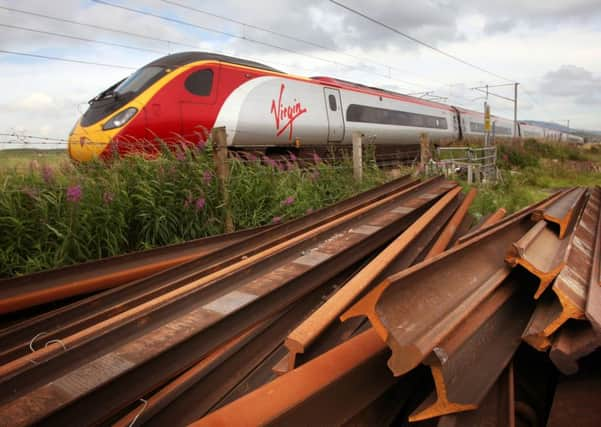Off the rails: Cancellations cause more misery


Operator Virgin East Coast blamed a broken down train for several afternoon cancellations in both directions,
The problems follow widespread delays and cancellations on Monday, blamed on three broken-down trains and a signals failure at Doncaster.
Advertisement
Hide AdAdvertisement
Hide AdMeanwhile, Virgin’s West Coast service was named the least punctual rail company in the country, with just under three-quarters (73.6%) of their trains arriving within five minutes of their scheduled time, according to new statistics.
The figure is more than a fifth lower than the best performing rail operator Merseyrail, with 95.6% of its trains arriving within five minutes.
The statistics, published today by the Office of Rail and Road, look at the punctuality of trains across Britain between April 2014 and March 2015.
Virgin West Coast Trains also had the highest numbers of trains reported arriving “significantly late”, meaning delays of between 30 and 119 minutes, a figure of 2.7%.
Advertisement
Hide AdAdvertisement
Hide AdThe only train operating company recording no services arriving later than 30 minutes was Merseyrail.
Southern had the highest proportion of cancelled services across the year, almost one in 20 trains (4.6%), while c2c had the lowest proportion, just 1.2%.
South West Trains had the worst record for dealing with complaints, answering just under half (48.5%) within the industry target of 20 working days, while Southeastern was the only company to reach the target for all complaints.
Southern had the lowest complaints rate, receiving 9.5 for every 100,000 passenger journeys.
Advertisement
Hide AdAdvertisement
Hide AdVirgin West Coast Trains had the highest rate, receiving 227.9 per 100,000 journeys.
Comparable figures on complaints were released for all operating companies except Grand Central Trains.
Grand Central showed the most improved punctuality year-on-year, with a 12.5% increase in the number of trains arriving within five minutes of schedule.
First Transpennine Express performed worst on this measure, showing a 6.1% decrease in trains arriving within five minutes.
Advertisement
Hide AdAdvertisement
Hide AdThe punctuality targets for 2014/2015 set by The Office of Rail and Road expect regional rail companies to ensure an average of 91.0% of their train arrive within five minutes of their scheduled time, or within ten minutes for long distance rail companies.
The target for England and Wales, which narrowly changes depending on the rail operator, will gradually increase over the next few years to an average of 92.5% by 2018/2019.
Meanwhile, the target for cancellations and significant lateness has been set as 2.2%.
A spokesman for Transport Focus said: “The Office of Rail and Road’s figures confirm what many passengers already experience - running punctual and reliable trains remains too patchy.
Advertisement
Hide AdAdvertisement
Hide Ad“This is unacceptable for passengers and it is essential that train companies and Network Rail step up efforts to stop problems happening in the first place and fix things quickly when problems do occur.
“Punctuality remains one of the top priorities for improvement - as rated by passengers. Although it may be of little comfort, it is worth remembering that delays of over 30 minutes entitle passengers to compensation.”
Manuel Cortes, leader of the TSSA rail union, said: “These figures underline the folly of the franchise system which means passengers are always picking up the bill for the most expensive network in Europe.
“Virgin has been the least punctual service in the UK for the past year but it still gets rewarded for failure by being awarded the contract to run East Coast as well.
Advertisement
Hide AdAdvertisement
Hide Ad“Our private railways would not be out of place in Alice In Wonderland.”
A spokesman for the Rail Delivery Group, representing train operators and Network Rail, said: “We are committed to improving punctuality on a much busier network. We know that we can always do better to deliver the timetable passengers expect.
“Every part of the rail industry is working hard to cut delays, to improve how we communicate with passengers when things go wrong and to deliver the other improvements which the travelling public deserve.”